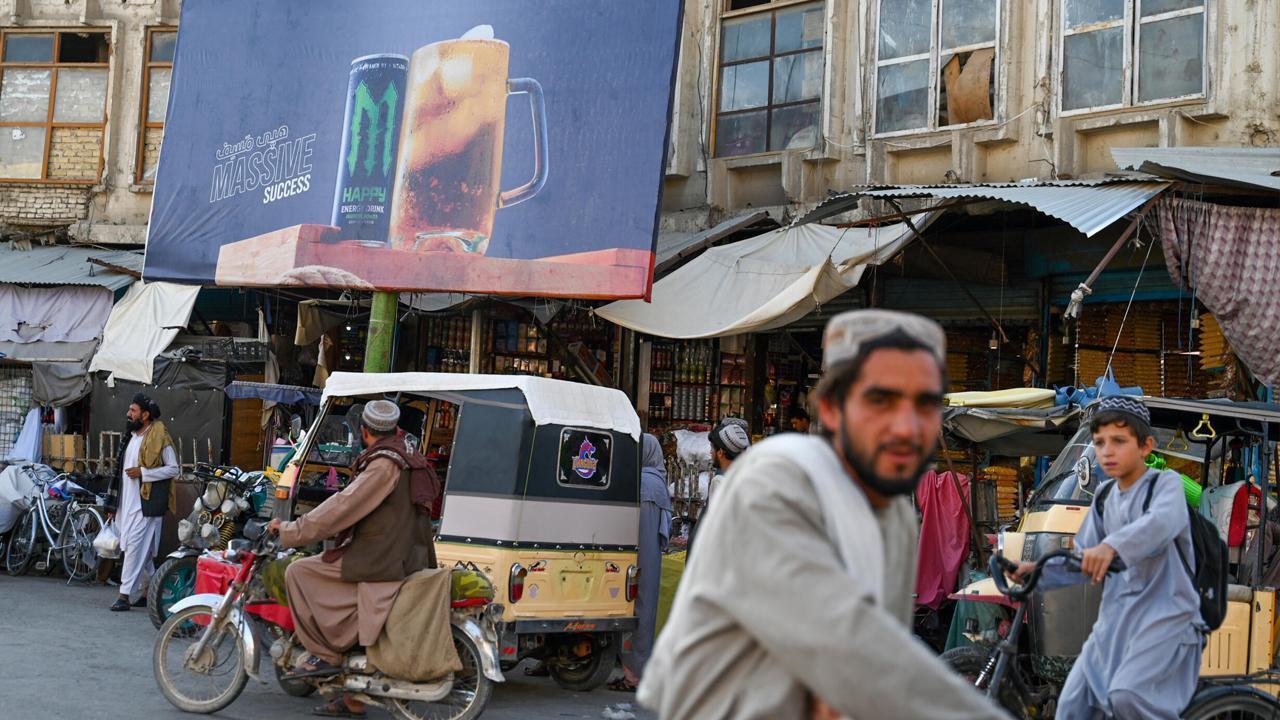
Post by: Raman Preet
Photo : AFP
In Afghanistan, where alcohol is strictly forbidden, energy drinks packed with caffeine have taken over as the stimulant of choice for many. In the western city of Herat, a warehouse buzzes with activity, producing 24 cans of energy drinks every second. These drinks have become a popular, and sometimes essential, pick-me-up for Afghans who face a tough, day-to-day existence.
Despite the Taliban’s efforts to cleanse Afghanistan of Western influences, the energy drink craze, which gained momentum during the U.S. military presence, remains a booming business. A domestic industry has even sprouted up to meet the demand, with local brands like "Commando," "Attack," and "Predator" drawing on Afghanistan’s wartime past to appeal to consumers.
The consumption of energy drinks is widespread, cutting across all segments of society. Everyone from secret police officers to children are seen grabbing cans from roadside kiosks. These drinks, often advertised more heavily than even Taliban propaganda, are a symbol of escape for many in the country. According to Milad Ghaznavi, a 19-year-old from Herat, energy drinks have become more than just a beverage—they’re a coping mechanism for the hardships of life. Ghaznavi, who used to drink them regularly before quitting for health reasons, said they’ve become “a habit and a craving” for many Afghans.
Stay informed with the latest news. Follow DXB News Network on WhatsApp Channel
The health impact of these drinks, however, is significant. High in caffeine and sugar, energy drinks are readily available across Afghanistan, sometimes more accessible than drinking water. For many Afghans, they have become a means of supplementing an inadequate diet. The World Food Programme (WFP) reports that nearly 90 percent of Afghanistan’s population is consuming insufficient food, with many families relying on cheap, less-preferred meals or reducing portion sizes to make ends meet.
For laborers like Gulzar, energy drinks are essential to get through grueling workdays. The 40-year-old, who goes by one name, consumes four cans of "Hit" each day during his 14-hour shifts. "We sweat and get tired, so when we drink energy drinks, it helps," Gulzar explained. "Without them, you’re exhausted, you have headaches, you just feel drained."
But this constant consumption of energy drinks comes at a cost. Gulzar’s daily intake includes more than 100 grams of sugar—twice the amount recommended by the World Health Organization—as well as enough caffeine to equal six espressos. Excessive caffeine consumption can lead to a range of health problems, including high blood pressure, heart palpitations, anxiety, and insomnia, according to the U.S. Food and Drug Administration. Yet for people like Gulzar, there’s no alternative. "Afghanistan is beyond impoverished," he said. "If we could afford better, we wouldn’t rely on these."
In the Afghan market, local energy drinks are affordable, costing around 30 Afghani ($0.40) per can, while imported brands like Red Bull and Monster remain out of reach for the majority. For the poorest, energy drinks are a luxury, and many instead survive on bread and caffeinated green tea, relying on these basic foods to keep them going.
Energy drinks have become big business in Afghanistan. While the global energy drink industry is estimated to be worth nearly $40 billion in 2024, Afghanistan has its own growing sector. In Herat, Pamir Cola, one of the country’s leading energy drink manufacturers, produces over a million cans a day, despite acknowledging that it is only a small player in the market. The company estimates that Afghanistan’s energy drink production equals roughly two cans per day for each of the country’s 40 million people. However, without reliable data on Afghan commerce, verifying this figure is impossible.
Inside Pamir Cola’s factory, workers operate machines that churn out energy drinks as long as electricity flows, mixing sugar and citric acid into every batch. The company claims to adhere to European standards, though Afghanistan’s market remains largely unregulated.
Zahir Shah Bahaduri, who runs Pamir Cola with his brothers, has no illusions about the nature of their product. "For the people of Afghanistan who do hard labor and don’t have good food, energy drinks are the best option," the 45-year-old said. Bahaduri believes that business is booming and will likely continue to grow, despite the challenges facing the country.
On the highways of Kabul, vendors sell crates of energy drinks to drivers who stop to buy a quick pick-me-up. For some Afghans, these caffeinated beverages have become the small joy in an otherwise challenging life. "It takes away their tiredness," said Ahmad Gulab, a 36-year-old vendor. "For many, it’s their only source of happiness."
Energy drinks may not be a lasting solution to the struggles Afghans face, but for now, they offer a brief respite from the daily grind.
#trending #latest #EnergyDrinks #CaffeineCraze #AfghanistanLife #HeratProduction #AfghanEconomy #CaffeineCulture #AfghanStruggles #HealthImpact #PovertyInAfghanistan #TalibanEra #AfghanIndustry #headlines #topstories #globalUpdate #dxbnewsnetwork #dxbnews #dxbdnn #dxbnewsnetworkdnn #bestnewschanneldubai #bestnewschannelUAE #bestnewschannelabudhabi #bestnewschannelajman #bestnewschannelofdubai #popularnewschanneldubai

Ananya Panday stuns in a vintage cyan saree with gajra at the Kesari 2 trailer launch. Her fresh summer look is a perfect festive style inspiration....Read More.

Dubai Police managed 45,845 calls over Eid, including 40,715 emergencies via 999 and 5,130 non-urgent queries via 901, ensuring quick response times....Read More.














Safeer Mall in Sharjah Closes After Decades as a Beloved Shopping Spot
Iconic Safeer Mall in Sharjah shuts down after nearly two decades, leaving residents nostalgic for i

Barcelona Beat Atletico to Set Up Copa Final vs Real Madrid
Barcelona edged Atletico 1-0 to reach the Copa del Rey final, where they’ll face rivals Real Madrid

UAE Wins 16 Medals at Special Olympics World Winter Games 2025
UAE athletes shine at Special Olympics Winter Games 2025, winning 16 medals. A proud moment for incl

Meta’s AI Research Head Joelle Pineau to Step Down in May
Joelle Pineau, Meta’s VP for AI research, will step down in May after 8 years. She led Meta’s open-s

Real Madrid Edge Real Sociedad in 4-4 Thriller to Reach Final
Real Madrid fought back from 4-2 down to draw 4-4 with Real Sociedad sealing a 5-4 aggregate win. Ru